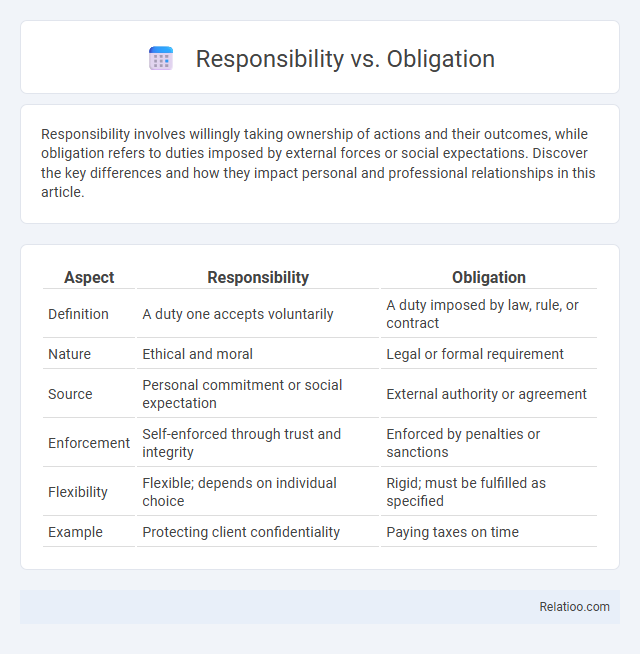Responsibility involves willingly taking ownership of actions and their outcomes, while obligation refers to duties imposed by external forces or social expectations. Discover the key differences and how they impact personal and professional relationships in this article.
Table of Comparison
| Aspect | Responsibility | Obligation |
|---|---|---|
| Definition | A duty one accepts voluntarily | A duty imposed by law, rule, or contract |
| Nature | Ethical and moral | Legal or formal requirement |
| Source | Personal commitment or social expectation | External authority or agreement |
| Enforcement | Self-enforced through trust and integrity | Enforced by penalties or sanctions |
| Flexibility | Flexible; depends on individual choice | Rigid; must be fulfilled as specified |
| Example | Protecting client confidentiality | Paying taxes on time |
Understanding Responsibility vs Obligation
Understanding the difference between responsibility and obligation is crucial for effective decision-making and accountability. Responsibility refers to the duty or role one willingly accepts, often tied to personal or professional roles, while obligation implies a binding commitment imposed by external rules, laws, or social expectations. Recognizing this distinction enhances clarity in task management and ethical behavior across organizational and interpersonal contexts.
Defining Responsibility
Responsibility refers to the duty to manage or take care of tasks or people, often implying accountability and ethical commitment. Unlike an obligation, which is a formal or legal requirement, responsibility involves a personal or moral dimension where one is answerable for outcomes. Clarifying responsibility helps in understanding the scope of actions expected beyond mere compliance, emphasizing ownership and proactive engagement.
Defining Obligation
Obligation refers to a binding commitment to perform a specific act or duty, often established by law, contract, or moral principle, requiring compliance regardless of personal preference. Unlike responsibility, which entails accountability for outcomes and the ability to choose actions, obligation imposes a mandatory requirement that must be fulfilled. Understanding obligation includes recognizing its enforceability and external imposition, distinguishing it from responsibility and general notions of duty.
Key Differences Between Responsibility and Obligation
Responsibility refers to a duty or task that You are expected to perform based on roles or personal commitment, while obligation is a binding requirement often imposed by external rules, laws, or moral principles. Responsibility involves voluntary acceptance and accountability for outcomes, whereas obligation denotes a compulsory action that You must fulfill regardless of willingness. Understanding the distinction helps clarify when actions are self-motivated versus externally mandated, enhancing personal and professional decision-making.
The Psychological Impact of Responsibility
The psychological impact of responsibility often manifests as increased stress and anxiety due to the awareness of potential consequences and the burden of accountability. Obligation, typically imposed externally, can lead to feelings of resentment or burnout when individuals feel compelled to act against their will or interests. Taking responsibility proactively, however, enhances self-efficacy and emotional resilience by fostering a sense of control and purpose in personal and professional contexts.
Social and Legal Aspects of Obligation
Obligation in social and legal contexts refers to duties imposed by laws or societal norms that require specific behaviors or actions, often enforceable through legal sanctions. Responsibility involves a moral or ethical duty to act correctly, which may or may not be legally mandated, while accountability ensures individuals or entities are held answerable for fulfilling their obligations. Understanding the distinction between these concepts is crucial for comprehending how laws and social expectations govern behavior and maintain order.
How Responsibility Shapes Personal Growth
Responsibility drives personal growth by fostering accountability and self-discipline, encouraging individuals to make conscious decisions and learn from their experiences. Unlike obligation, which often stems from external demands, responsibility is internally motivated and promotes a deeper understanding of one's actions and their consequences. Embracing responsibility cultivates resilience, critical thinking, and a proactive mindset essential for continuous development and self-improvement.
Fulfillment and Motivation: Responsibility vs Obligation
Responsibility stems from intrinsic motivation and a sense of fulfillment, driving individuals to act out of commitment and personal values. Obligation often arises from external demands or social expectations, leading to actions performed out of duty rather than genuine desire. Understanding the difference highlights how fulfillment enhances motivation when responsibility aligns with personal goals, whereas obligation may result in compliance without engagement.
Real-Life Examples in Work and Relationships
In work environments, responsibility often means owning tasks like managing projects or meeting deadlines, while obligation refers to mandatory duties such as adhering to company policies. In relationships, responsibility involves actively supporting a partner's emotional needs, whereas obligation may stem from societal expectations like attending family events. Your ability to distinguish these concepts enhances collaboration and trust both professionally and personally.
Developing a Balance Between Responsibility and Obligation
Developing a balance between responsibility and obligation requires understanding their distinct roles: responsibility involves taking ownership and initiative, while obligation is often externally imposed duties. You can enhance personal growth by prioritizing responsibilities aligned with your values, ensuring obligations do not overwhelm your capacity or goals. Striking this balance fosters accountability and prevents burnout, creating a sustainable approach to managing both internal motivations and external demands.

Infographic: Responsibility vs Obligation
 relatioo.com
relatioo.com